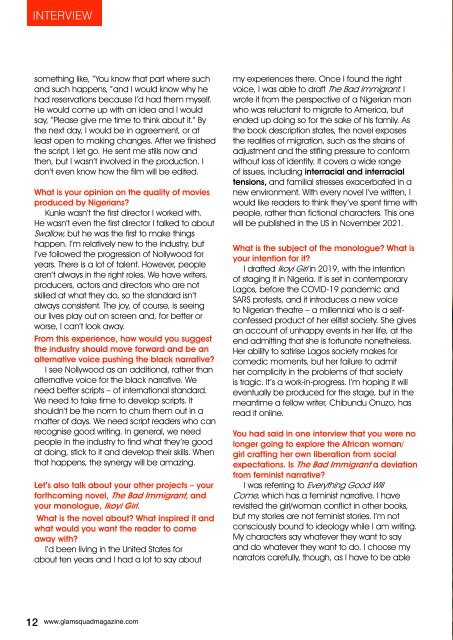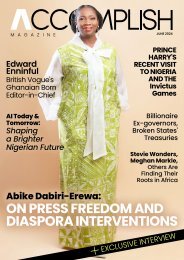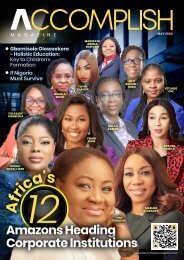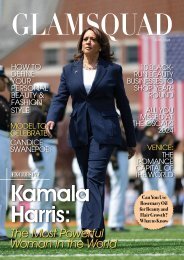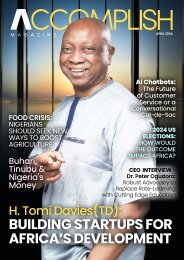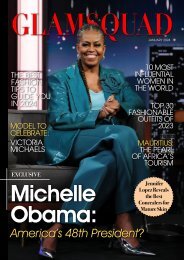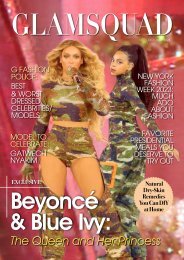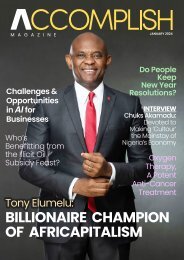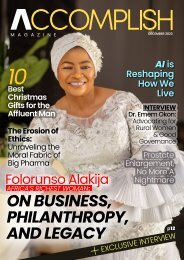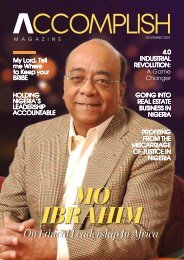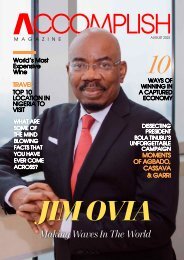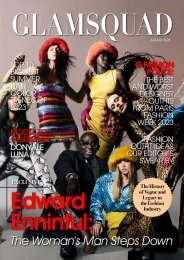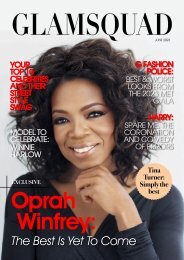Glamsquad Magazine May 2021
Sefi Atta - Nigeria's Writing Export To The World
Sefi Atta - Nigeria's Writing Export To The World
Create successful ePaper yourself
Turn your PDF publications into a flip-book with our unique Google optimized e-Paper software.
INTERVIEW<br />
something like, “You know that part where such<br />
and such happens,” and I would know why he<br />
had reservations because I’d had them myself.<br />
He would come up with an idea and I would<br />
say, “Please give me time to think about it.” By<br />
the next day, I would be in agreement, or at<br />
least open to making changes. After we finished<br />
the script, I let go. He sent me stills now and<br />
then, but I wasn’t involved in the production. I<br />
don’t even know how the film will be edited.<br />
What is your opinion on the quality of movies<br />
produced by Nigerians?<br />
Kunle wasn’t the first director I worked with.<br />
He wasn’t even the first director I talked to about<br />
Swallow, but he was the first to make things<br />
happen. I’m relatively new to the industry, but<br />
I’ve followed the progression of Nollywood for<br />
years. There is a lot of talent. However, people<br />
aren’t always in the right roles. We have writers,<br />
producers, actors and directors who are not<br />
skilled at what they do, so the standard isn’t<br />
always consistent. The joy, of course, is seeing<br />
our lives play out on screen and, for better or<br />
worse, I can’t look away.<br />
From this experience, how would you suggest<br />
the industry should move forward and be an<br />
alternative voice pushing the black narrative?<br />
I see Nollywood as an additional, rather than<br />
alternative voice for the black narrative. We<br />
need better scripts – of international standard.<br />
We need to take time to develop scripts. It<br />
shouldn’t be the norm to churn them out in a<br />
matter of days. We need script readers who can<br />
recognise good writing. In general, we need<br />
people in the industry to find what they’re good<br />
at doing, stick to it and develop their skills. When<br />
that happens, the synergy will be amazing.<br />
Let’s also talk about your other projects – your<br />
forthcoming novel, The Bad Immigrant, and<br />
your monologue, Ikoyi Girl.<br />
What is the novel about? What inspired it and<br />
what would you want the reader to come<br />
away with?<br />
I’d been living in the United States for<br />
about ten years and I had a lot to say about<br />
my experiences there. Once I found the right<br />
voice, I was able to draft The Bad Immigrant. I<br />
wrote it from the perspective of a Nigerian man<br />
who was reluctant to migrate to America, but<br />
ended up doing so for the sake of his family. As<br />
the book description states, the novel exposes<br />
the realities of migration, such as the strains of<br />
adjustment and the stifling pressure to conform<br />
without loss of identity. It covers a wide range<br />
of issues, including interracial and interracial<br />
tensions, and familial stresses exacerbated in a<br />
new environment. With every novel I’ve written, I<br />
would like readers to think they’ve spent time with<br />
people, rather than fictional characters. This one<br />
will be published in the US in November <strong>2021</strong>.<br />
What is the subject of the monologue? What is<br />
your intention for it?<br />
I drafted Ikoyi Girl in 2019, with the intention<br />
of staging it in Nigeria. It is set in contemporary<br />
Lagos, before the COVID-19 pandemic and<br />
SARS protests, and it introduces a new voice<br />
to Nigerian theatre – a millennial who is a selfconfessed<br />
product of her elitist society. She gives<br />
an account of unhappy events in her life, at the<br />
end admitting that she is fortunate nonetheless.<br />
Her ability to satirise Lagos society makes for<br />
comedic moments, but her failure to admit<br />
her complicity in the problems of that society<br />
is tragic. It’s a work-in-progress. I’m hoping it will<br />
eventually be produced for the stage, but in the<br />
meantime a fellow writer, Chibundu Onuzo, has<br />
read it online.<br />
You had said in one interview that you were no<br />
longer going to explore the African woman/<br />
girl crafting her own liberation from social<br />
expectations. Is The Bad Immigrant a deviation<br />
from feminist narrative?<br />
I was referring to Everything Good Will<br />
Come, which has a feminist narrative. I have<br />
revisited the girl/woman conflict in other books,<br />
but my stories are not feminist stories. I’m not<br />
consciously bound to ideology while I am writing.<br />
My characters say whatever they want to say<br />
and do whatever they want to do. I choose my<br />
narrators carefully, though, as I have to be able<br />
12<br />
www.glamsquadmagazine.com


